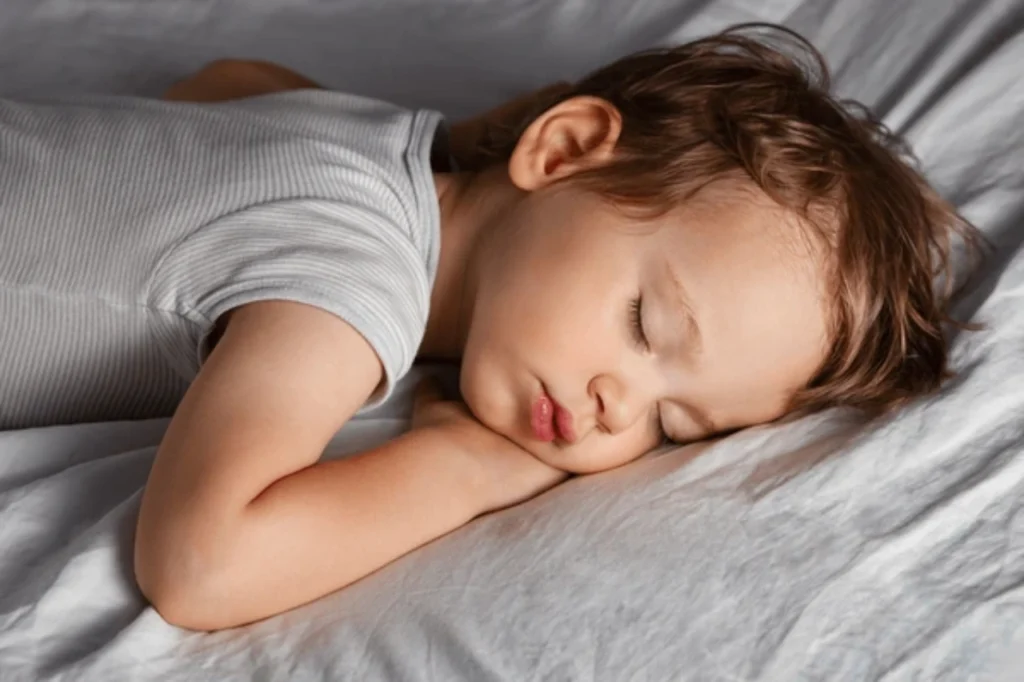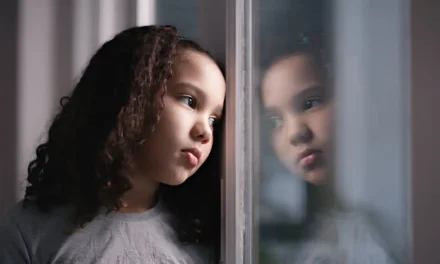Roles of sleep in a child’s development and health are vital. It impacts their physical, mental, and emotional well-being, supporting growth, tissue repair, muscle building, cognitive clarity, and emotional regulation.
Knowing how important sleep is can really help a child grow and do well in the future. This guide will help parents understand sleep better. It will show them how to create a good sleep space for their kids.
Key Takeaways
- Sleep is very important for a child’s growth and development, affecting their physical, cognitive, and emotional health.
- Enough sleep helps the brain grow, controls hormones, fixes tissues, and builds muscles.
- Not getting enough sleep can cause problems like bad grades, behavior issues, and health risks.
- It’s important to have good sleep habits and a sleep-friendly environment for kids to grow well.
- Knowing how much sleep kids need and dealing with sleep problems can help them get the rest they need.
Understanding the Science Behind Sleep and Child Development
Sleep is key for a child’s growth, helping their brain, hormones, and neural pathways. Studies have shown2 that kids who don’t sleep enough have different brain structures. They also face more mental health and behavior issues than well-rested kids.
Brain Development During Sleep Cycles
Deep sleep is when the brain works hard, making memories and processing info. Research indicates3 that sleep issues can cause mood swings, low energy, and sickness3. Lack of sleep can also lead to emotional problems like mood swings, anxiety, and depression3.
Hormonal Changes in Sleeping Children
Hormones change during sleep, helping kids grow. Sleep boosts the immune system by making proteins called cytokines during deep sleep3. Not enough sleep can mess with hunger hormones, leading to overeating and obesity in kids3.
Neural Pathway Formation
Sleep is crucial for creating neural pathways, important for thinking and solving problems. Brain scans2 show that sleep affects brain structure and function in kids. These changes can last a long time, showing sleep’s lasting impact on brain development2.
| Sleep Needs by Age | Total Hours of Sleep per Day |
|---|---|
| Newborns (0-3 months) | 14-17 hours4 |
| Infants (4-11 months) | 12-15 hours4 |
| Toddlers (1-2 years) | 11-14 hours4 |
| Preschoolers (3-5 years) | 10-13 hours3 |
| School-age Children (6-13 years) | 9-12 hours3 |
| Teens (14-17 years) | 8-10 hours2 |
The amount of sleep kids need changes with age. Newborns need the most, while teens need the least4. It’s important to make sure kids get the right amount of sleep for their health and growth.
The Impact of Sleep on Physical Growth
Sleep is key for kids’ growth. It’s when the body makes growth hormones for muscles and fixing tissues. Quality sleep also boosts the immune system, helping kids fight off sickness. It also helps prevent obesity by controlling hunger and metabolism hormones5.
Studies reveal that growth hormone is released at night, especially during deep sleep. Kids who don’t get enough deep sleep might stop growing as expected6. Kids with sleep issues like sleep apnea might not get enough growth hormone because their sleep is broken6.
It’s also found that kids who don’t sleep well are more likely to become obese6. Not enough sleep in early years can lead to obesity later on. Sleep problems in kids can cause serious issues like obesity6.
| Age Group | Recommended Sleep Duration |
|---|---|
| Newborns (0-1 year) | 16 hours |
| Toddlers (1-2 years) | 11 to 14 hours |
| Preschoolers (3-5 years) | 10 to 13 hours |
| School-aged children (6-13 years) | 9 to 11 hours |
| Teenagers (14-17 years) | 8 to 10 hours |
As kids grow, so do their sleep needs. Parents should make sure their kids sleep enough5. Sleep issues like nightmares and insomnia can be helped with good sleep habits and a regular bedtime routine5.
Sleep and Childhood Growth: Essential Connection
Quality sleep is key for a child’s growth and development. During sleep, the body changes hormones and repairs itself. This impacts a child’s growth and health.
Growth Hormone Release During Sleep
Growth hormone, vital for kids, is released during deep sleep7. It helps with muscle and bone growth, and tissue repair. This hormone is crucial for a child’s growth and maturation.
Tissue Repair and Regeneration
Sleep helps the body repair and grow. It focuses on healing and growth during sleep7. This is especially important for kids, as their bodies are always changing.
Muscle Development Process
Sleep is linked to muscle growth in kids. Growth hormone released during sleep helps build and strengthen muscles7. Good sleep is key for muscle development and overall health.
In summary, sleep is vital for a child’s growth and development. It affects hormone release, body repair, and muscle growth. Ensuring enough sleep is crucial for a child’s health and growth.
| Sleep Requirement by Age | Total Sleep Hours per Day |
|---|---|
| Newborns (0-1 month) | 15.5 – 17 hours8 |
| Infants (4-5 months) | 14.5 – 16 hours8 |
| Toddlers (18-35 months) | 12 – 13 hours8 |
| Preschoolers (3-5 years) | 10.5 – 11.5 hours8 |
“Babies spend about 95% of their time asleep in the womb.”9
Understanding sleep’s role in growth helps parents support their kids’ development789.
Cognitive Development and Sleep Patterns

Quality sleep is key for a child’s brain growth. It helps the brain keep memories and learn from the day. Good sleep boosts brain skills like focus, attention, and solving problems. This means kids do better in school.
Children who sleep 9-12 hours a night focus better, behave well, and learn more in school10. But, not enough sleep hurts brain skills. It makes it hard to make decisions, solve problems, remember things, and learn10.
A study with over 8,300 kids aged 9-10 showed a link between sleep and brain size10. Kids who slept less had less brain matter in areas for attention, memory, and control10. Also, pre-teens who slept too little had trouble with memory, solving problems, and making decisions10.
Sleep affects more than school grades. It also impacts mental health. Not enough sleep can lead to depression, anxiety, and acting out1011.
Research shows sleep is vital for brain and school success. But, we need more studies to understand sleep’s long-term effects on kids’ brains and learning10.
| Sleep Duration Recommendations | Sleep-Related Cognitive Impacts |
|---|---|
| 6-12 years: 9-12 hours per night10 | Improved concentration, attention, and problem-solving10 |
| Less than 9 hours per night | Impaired decision-making, conflict-solving, working memory, and learning10 |
| Increased risk of mental health issues like depression, anxiety, and impulsivity1011 |
“Adequate sleep is essential for a child’s cognitive development, as it enables the brain to consolidate memories and process information learned during the day. Insufficient sleep can have far-reaching consequences, impacting academic performance, mental health, and overall well-being.”
By focusing on quality sleep, parents help their kids grow smarter. This helps kids succeed in school and life. Teaching kids to sleep well is a big investment in their future101112.
Roles of Sleep in Emotional Regulation
Sleep is key for a child’s emotional health. Not enough sleep can make them irritable and moody. Regular sleep patterns help manage emotions, reducing stress and13 improving outlook and resilience13.
Managing Stress and Anxiety
Lack of sleep can make negative feelings worse, like depression and anger. It also makes it harder to feel good13. Good sleep helps kids deal with stress and builds emotional strength13. Bad sleep, however, can make them blame others more and feel angry13.
Emotional Processing During Sleep
The brain sorts through emotions while we sleep. This is key for handling stress and anxiety. Not sleeping well can mess with this process, making it harder to feel good13.
Building Emotional Resilience
Sleep is vital for a child’s emotional growth and strength. Enough sleep helps control emotions, lowers stress, and keeps a positive view. Those who can’t handle negative feelings as well after not sleeping well13. By focusing on good sleep, parents help their kids stay emotionally strong and ready for life’s ups and downs14.
| Sleep Deprivation Impact | Emotional Consequences |
|---|---|
| Enhanced negative emotional reactivity | Increased depression, confusion, anger, frustration, irritability, and aggression |
| Decreased positive reactions to positive events | Increased blame, hostility, and impaired emotional regulation |
| Impaired prefrontal activation | Dysfunctional emotional regulation |
“Sleep deprivation leads to enhanced negative emotional reactivity and decreased positive reactions to positive events.”
Age-Specific Sleep Requirements

It’s key to make sure your child sleeps enough for their growth and health. Sleep needs change with age, and knowing these needs is important for their well-being15. Newborns (0 to 3 months) need 11 to 17 hours of sleep each day16. Infants from 4 months to 12 months should sleep 12 to 16 hours a day for health17.
As kids grow, so do their sleep needs15. Toddlers (1 to 3 years) need 11 to 14 hours of sleep, including naps16. Children aged 1 to 2 years should sleep 11 to 14 hours daily for health17.
15 Preschoolers (3 to 5 years) need 10 to 13 hours of sleep, which may include a nap16. Children aged 3 to 5 years should sleep 10 to 13 hours daily for health17.
15 School-aged children (6 to 13 years) need 9 to 11 hours of sleep16. Children aged 6 to 12 years should aim for 9 to 12 hours of sleep daily for health17.
15 Teenagers (14 to 17 years) need 8 to 10 hours of sleep16. Teenagers aged 13 to 18 years should sleep 8 to 10 hours daily for health.
Remember, these are just guidelines. Some kids might need more or less sleep than others. Parents should watch their child’s sleep needs and adjust their schedules as needed16. Not enough sleep can lead to problems with attention, behavior, and learning16.
Insufficient sleep can also increase the risk of accidents, injuries, and health issues like hypertension, obesity, diabetes, and depression16. Teenagers who don’t get enough sleep are at higher risk of self-harm and suicidal thoughts.
| Age Group | Recommended Sleep Duration |
|---|---|
| Newborns (0-3 months) | 14-17 hours15 |
| Infants (4-12 months) | 12-16 hours16 |
| Toddlers (1-2 years) | 11-14 hours17 |
| Preschoolers (3-5 years) | 10-13 hours15 |
| School-aged children (6-12 years) | 9-12 hours16 |
| Teenagers (13-18 years) | 8-10 hours16 |
Ensuring your child gets the right amount of sleep duration supports their child development stages and promotes healthy sleep needs. Every child is different, so it’s important to adjust sleep schedules to meet their individual needs for optimal growth and well-being.
Sleep Quality vs. Sleep Quantity
Both sleep quality and quantity are vital for kids’ growth. Quality sleep means uninterrupted rest, helping the brain and body heal. Sleep quantity is how long a child sleeps, which changes with age and needs.
Measuring Sleep Effectiveness
Measuring sleep isn’t just about how long a child sleeps. It’s also about their day-to-day behavior and mood. Kids who sleep well wake up feeling fresh, stay alert, and act better18.
Signs of Quality Sleep
Knowing when a child sleeps well is important. They usually seem calm, focus better, and handle emotions well19.
Impact of Sleep Disruptions
Even with enough sleep, disruptions can harm a child’s mind and feelings. Things like bad sleep schedules, environments, and disorders can cause tiredness, mood swings, and bad behavior.
| Metric | Sleep Quality | Sleep Quantity |
|---|---|---|
| Definition | Uninterrupted rest cycles, allowing for proper brain and body restoration | Total duration of sleep, which can vary depending on the child’s age and individual needs |
| Measurement | Observing daytime behavior, mood, and performance | Tracking the number of hours a child sleeps |
| Importance | Crucial for physical, cognitive, and emotional development | Essential for overall growth and well-being |
Understanding the difference between sleep quality and quantity is key for kids’ development. By focusing on both, parents can help their children grow physically, mentally, and emotionally.
“Quality sleep is essential for children’s growth and development, as it allows their brains and bodies to rest and rejuvenate.”
The Link Between Sleep and Academic Performance
Quality sleep is key for a child’s success in school. Children who sleep well focus better, remember more, and solve problems easier. These skills help them do well in school20. On the other hand, not enough sleep makes it hard to pay attention and learn20.
Even a little less sleep can hurt a child’s school day20.
Many kids and teens in the U.S. have trouble sleeping21. Up to 25% of young kids and over 57% of middle schoolers don’t sleep enough21. For nearly one-quarter of teens, sleep problems are so bad they’re called insomnia21. These issues can really hurt a child’s school work, making good sleep habits very important.
| Key Findings on Sleep and Academic Performance |
|---|
| – 10.6% of children had poor school performance at T2 with n = 42320. |
| – Children with poor school performance at T2 had more symptoms of externalizing and internalizing mental health problems compared to their peers20. |
| – Persistent difficulties initiating and maintaining sleep (DIMS) at both T1 and T2 were associated with an increased risk of poor academic performance20. |
| – Transitory DIMS (DIMS at T1 but not at T2) did not increase the risk of later poor academic performance20. |
| – Persistent DIMS were associated with an increased risk of poor academic performance after controlling for mental health problems20. |
In summary, kids need good, quality sleep to do well in school. By focusing on healthy sleep, parents and teachers can help kids learn better, focus more, and do well in school.
“Healthy sleep habits are essential for a child’s academic achievement. Even small changes in sleep patterns can impact learning, memory, and focus.”
Behavioral Changes from Sleep Deprivation
Getting enough sleep is key for kids to stay healthy. Sadly, not enough sleep can cause bad behavior in children22.
One big problem is trouble focusing. Kids who don’t sleep well might find it hard to stay on task. They might seem like they have ADHD23. They can also get moody, swinging from being grumpy to too active22.
Not sleeping well can also mess with how kids interact with others. They might get angry easily, be impatient, and act without thinking. This can hurt their friendships and family ties23. These changes can affect their school work, how they make friends, and their happiness.
It’s important for kids to have a regular sleep schedule. This helps them behave well and get along with others2223. Helping kids sleep better can stop these bad behaviors. It helps them grow and develop in a good way.
Attention and Focus Issues
- Sleep problems can make kids have trouble focusing, like ADHD23.
- They might find it hard to stay focused on schoolwork or fun activities23.
Mood Fluctuations
- Kids who don’t sleep well can swing from being grumpy to too active22.
- They might get upset easily and have mood swings22.
Social Interaction Changes
Kids who don’t sleep well might have trouble with friends and family. They might get angry, be impatient, and act without thinking. This can hurt their relationships23.
| Behavioral Impact | Prevalence |
|---|---|
| Attention and Focus Issues | Children who don’t sleep enough often have trouble focusing, like ADHD23. |
| Mood Fluctuations | Kids who don’t sleep well can swing from being grumpy to too active22. |
| Social Interaction Changes | They might get angry, be impatient, and act without thinking, hurting relationships23. |
“Consistent sleep patterns are crucial for maintaining stable behavior and positive social interactions in children.”
Creating Optimal Sleep Environments
Creating a cozy and quiet bedroom is key for good sleep in kids. It helps them grow and develop well.
Make sure the room is quiet and calm. Use dark curtains or shades to keep out light. Or, a nightlight can help if your child is scared of the dark. Keeping the room a bit cooler also helps sleep better24.
Set a bedtime routine to signal sleep time. This could be reading, a warm bath, or soft music25. Don’t have screens in the bedroom to keep it peaceful26.
| Age Group | Recommended Sleep Duration |
|---|---|
| Infants (0–12 months) | 14–15 hours25 |
| Toddlers (1–3 years old) | 12–14 hours25 |
| Preschoolers (3–5 years old) | 11–13 hours25 |
| School-age children (5–12 years old) | 10–12 hours25 |
By making the bedroom cozy and calm, your child gets the sleep they need for growth242526.
“The quality of a child’s sleep can have a profound impact on their physical, cognitive, and emotional well-being.”
Starting healthy sleep habits early is important for your child’s future success2526.
Sleep Disorders in Children
Sleep disorders are common in kids, with up to 50% experiencing some sleep problem27. Around 4% of children have a diagnosed sleep disorder27. These issues can affect their health, growth, and happiness.
Common Sleep Disorders
Children often face insomnia, sleep apnea, restless leg syndrome, and night terrors. Insomnia affects 20% to 30% of kids28. Sleep apnea, which can be serious, affects 1% to 5% of children, especially ethnic minorities27. Parasomnias, like sleepwalking and talking, affect up to 50% of kids27.
Warning Signs and Symptoms
Children with sleep disorders might be very sleepy during the day, act out, or struggle in school27. Up to 20% of kids show too much daytime sleepiness28. Snoring, a sign of sleep apnea, affects up to 27% of children27.
Treatment Approaches
Treatment for sleep disorders in kids depends on the problem. For insomnia, setting up good sleep habits can help28. Sleep apnea might need weight loss, changes in the environment, or surgery like adenotonsillectomy, which works for over 70% of normal-weight kids27. For parasomnias, finding and fixing what causes the problem can help28.
Parents need to know about sleep disorders in kids and work with doctors to get the right help. Early action can help kids stay healthy, grow well, and do well in school.
Establishing Healthy Sleep Routines
Creating consistent sleep routines is key for kids’ health. Between29 81% and nearly 95% of parents in the U.S. have bedtime routines for their young ones. These routines include activities like turning off screens, getting dressed in pajamas, brushing teeth, and reading a story. Keeping a regular sleep schedule, even on weekends, is vital for healthy sleep habits29.
Socio-demographic factors like race and income level affect bedtime routines29. Kids from African American or Hispanic/Latino backgrounds and those from lower-income families are less likely to have a bedtime routine29. Also, African American families and those with lower incomes tend to do less interactive and hygiene-related activities before bed compared to Caucasian families and those with higher incomes29. Setting up consistent sleep routines can help bridge these gaps and improve sleep for all kids.
To get a good night’s sleep, avoid caffeine, big meals, and sweets before bed30. Exercise during the day helps sleep, but avoid intense activities close to bedtime30. Teaching kids relaxation techniques like deep breathing or gentle stretching can also help them relax and sleep better.
FAQ
How does sleep impact a child’s growth and development?
How does sleep influence brain development in children?
What is the connection between sleep and physical growth in children?
How does sleep influence cognitive development in children?
What is the role of sleep in children’s emotional regulation and mental health?
How do sleep needs vary with a child’s age?
What factors determine the quality of a child’s sleep?
How does sleep impact a child’s academic performance?
What are the behavioral changes associated with sleep deprivation in children?
How can parents create an optimal sleep environment for their children?
What are common sleep disorders in children, and how can they be addressed?
How can parents establish healthy sleep routines for their children?
Source Links
- The Role of Sleep in Child Development and Health
- A Child’s Need for Sleep
- The Importance of Sleep for Children | Metro Pediatrics
- About sleep
- Why is sleep so important? | Texas Children’s
- How Sleep Problems Affect Growth Hormone in Children
- The connection between sleep and growth (ages 5 to 8)
- Sleep and cognitive development: How adequate sleep enhances learning in children
- Sleep & brain development: an important connection
- 2022 Archive – Children Who Lack Sleep May Experience Detrimental Impact on Brain and Cognitive Development That Persists Over Time, UM School of Medicine Study Finds
- Children’s sleep linked to brain development
- Childhood sleep: physical, cognitive, and behavioral consequences and implications
- Emotion, emotion regulation and sleep: An intimate relationship
- Sleep’s role in the development and resolution of adolescent depression – Nature Reviews Psychology
- How Much Sleep Do Kids Need? Recommended Hours by Age
- Consensus Statement of the American Academy of Sleep Medicine on the Recommended Amount of Sleep for Healthy Children: Methodology and Discussion
- How Much Sleep Do Babies and Kids Need?
- Which Is More Important for Health: Sleep Quantity or Sleep Quality?
- Sleep quantity, quality and optimism in children
- The association between sleep problems and academic performance in primary school-aged children: Findings from a Norwegian longitudinal population-based study
- Improve Your Child’s School Performance With a Good Night’s Sleep
- How Sleep Deprivation Impacts Mental Health
- Study flags later risks for sleep-deprived kids — Harvard Gazette
- Creating a Sleep-Friendly Environment: Must-Have Tips for Parents
- Sleep and Your Child: How You Can Build Healthy Sleep Routines | ECLKC
- Sleep Strategies for Kids
- Common Sleep Disorders in Children
- Sleep Disorders in Children | Sleep Foundation
- Benefits of a bedtime routine in young children: Sleep, development, and beyond
- Encouraging Good Sleep Habits – Child Mind Institute





